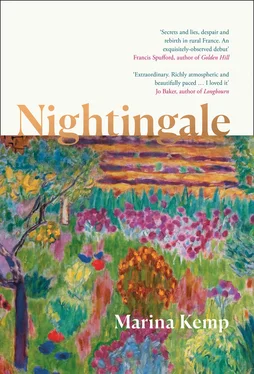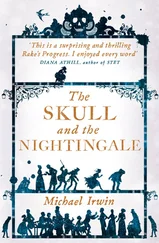‘I hope you’ll enjoy the three volumes,’ he said, turning to disappear back into the solemn darkness of his little booth.
Throughout his monologue, Marguerite had been conscious of being watched, and as she turned to leave she caught the eye of the woman sitting at a table close by. She wore a dark green hijab; her chin was raised imperiously. She didn’t drop her gaze. As Marguerite walked past to leave, she said: ‘And you are from …?’
‘Sorry?’
‘I haven’t seen you before. Where are you from?’
Marguerite paused. ‘I’m working here,’ she said.
‘Working where?’
‘In Saint-Sulpice.’
The woman narrowed her eyes, contemplating her. Then she smiled, a little wryly. ‘You’re Jérôme Lanvier’s new nurse, am I right?’
‘Yes.’
‘I could tell instantly. You’re from Paris?’
‘Yes.’
‘I knew that accent. Well, you must find it rather different here.’
‘Not so different from other places I’ve worked.’
The woman reached a hand out to shake Marguerite’s; she had long nails painted a dark, shiny aubergine. ‘I’m Suki. Very good to meet you. How do you like Rossignol?’
‘It’s comfortable.’
‘And Lanvier himself?’
‘Fine.’
‘That’s good. And your name …?’
‘Marguerite.’
‘Well, as I said, it’s good to meet you.’ She smiled again. ‘Enjoy your books, Marguerite.’
When she left the library, Marguerite stood for a moment to study the noticeboard on the wall outside, to delay the long walk home. A sign for a missing cat, a pamphlet listing a course of dance classes for the previous June, and a notice advertising a babysitter, with the phone number printed several times for people to tear off. Only two had been torn.
‘ “What, no wine?” said Dantès, turning pale, and looking alternately at the hollow cheeks of the old man and the empty cupboards. “What, no wine? Have you wanted money, father?”
‘“I want nothing now I have you,” said the old man. ’
‘Tired,’ Jérôme said loudly, with a croak as if he had not spoken for days. ‘Enough.’
‘Are you sure?’ Marguerite let the pages fall back, with her finger as a marker. He closed his eyes tight instead of answering. She had been enjoying reading; she hadn’t used her voice so much for almost a month. ‘Can I get you anything? Are you feeling comfortable?’ His response, as so often, was simply to screw his eyes tighter shut.
She rose and took the book he’d chosen from her selection to the table: a 1970s edition of The Count of Monte Cristo , its faded jacket showing a large full moon, shivering on the dark surface of water. She folded the corner of their page to mark it and felt a twinge of guilt for doing so; she thought of the librarian and his long list of rules, from which the prohibition of dog-earing a page had surely only been omitted on account of its sheer obviousness. ‘Flagrant disregard for the item’s longevity …’ she imagined him saying, and smiled to herself.
Turning to leave the room, she saw that the old man was watching her. He was lying flat on his back, a rigid straight line down the bed, his eyes swivelled to stare at her.
‘Don’t you laugh at me,’ he barked.
‘Sir, I—’
‘I will not tolerate it.’
‘But I didn’t—’
‘Just get out, now!’ He shut his eyes. ‘I can send you away the minute I don’t want you. Just one phone call and you’re out of here, scuttling back to whichever deplorable little hole you came from.’
She felt her cheeks colour; she took a deep breath.
Gradually, she became aware of a whirring in the room: a moth, throwing its body again and again at the ceiling lamp.
The old man was lying stiff and straight in the bed, his fists and eyes and everything clenched.
She watched him for a moment but he didn’t speak again and she left the room, walked straight out of the kitchen into the garden, into the blanket darkness. She breathed in deeply, felt the thud of her heartbeat gradually slow. There was a lightness in the air in spite of the cold; she could believe for the first time that spring was here.
She had never had a garden. Her childhood had been spent in an apartment on the fourth floor in the 16th arrondissement – large, with high ceilings and rich, heavy curtains. There was a balcony that they had been allowed to step out onto only under supervision from her mother or the au pair; it looked down over a wide, dappled avenue lined with trees. There was always someone walking a dog – she and her sister would think up names for the dogs they came to recognise.
She didn’t like to think of that. The garden here was hers and she wanted to make it grow. She would grow herbs, plant flowers. She would sit in the shade in the narrow olive groves and look over at her herb garden and pluck rosemary to put in little pots around the house. It would be her project.
And then when it was dark – this heavy, enveloping blackness – it would comfort her to think of her plants outside. They could line the house like ramparts.
The vegetables here were huge and beautiful. She had discovered the village market that morning, by chance, and bought red, yellow, brown and green tomatoes, their skins plump. The stall owner had said the green were the tastiest. She ate one as soon as she got home, bent over the sink. Its skin burst under her teeth.
There was a head of curly-leafed lettuce. It was so large, and had splayed open so generously, that she could have worn it on her own head like a bonnet. She washed it slowly, watched with pleasure the water turn black with mud. On a hook she hung a straw plait of garlic, its heads indecently bulbous. They shed veined paper over the kitchen surface.
She would make poule au pot for Jérôme’s dinner. Infirmity had made his appetite weak, but his eating habits carried the shadow of a once-greedy man: in spite of himself, his eyes widened when she brought in a plate of something he liked. He would gobble fast, with relish. She thought of him as she stood there surrounded by her vegetables, carefully unsheathing spring onions and slicing celery and scattering peppercorns. The chicken still held many of its feathers, which she plucked one by one, with care, thinking of Jérôme’s delicate white flesh.
She had started to doze, sitting in her chair in the kitchen as the stock bubbled, when the sound of a car in the driveway startled her. A door slammed, footsteps ground on gravel. No one visited the house; without thinking, she rushed to lock the door.
But it was Suki’s face that appeared at the window. She was dressed in a deep, violent magenta, out of place against the silver-greys and greens outside.
‘Don’t be alarmed,’ she said, smiling as Marguerite let her in. ‘I’ve caught you off guard.’ She studied Marguerite’s face for a moment. ‘You’ve been asleep.’
‘No, just – thinking,’ she said, rubbing her face.
‘Something smells nice.’ Suki walked past her into the kitchen, approached the cooker and peered into the casserole. ‘ Poule au Pot ?’
‘Yes.’
‘Lovely.’ She turned and leant back against the kitchen worktop, smiling, as if she had been there hundreds of times. Marguerite didn’t know what to say. She wanted her quiet kitchen back.
‘Can I get you something – a glass of water?’
‘Oh, please don’t trouble yourself. Actually, I can’t stay long.’ She took a pack of cigarettes out of her bag, and turned to light one on the gas hob. ‘I was just passing, and thought I’d come to say hello and see how you’re getting on.’
No one passed by the house.
‘I’m fine.’
She thought of the cigarette smoke floating through into Jérôme’s room.
Читать дальше










